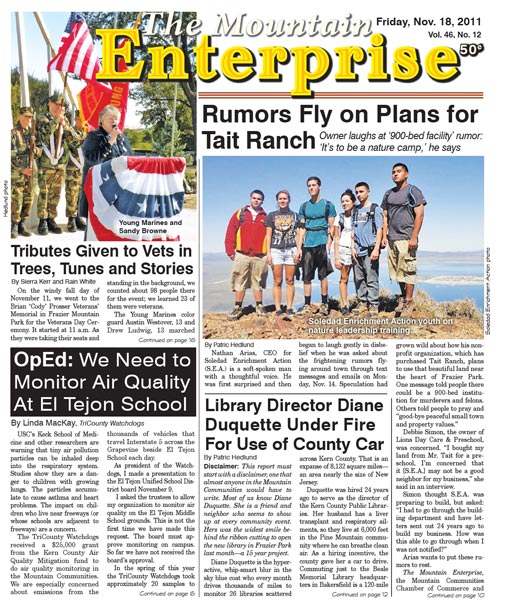By Patric Hedlund, Managing Editor, The Mountain Enterprise
Parental Advisory: You may not wish your child to read this column. It contains disturbing information.
There are many kinds of inconvenient truths.
Former vice president and Democratic presidential candidate Al Gore made a lasting name for himself speaking about global warming as ‘an inconvenient truth.’ But there may be other inconvenient truths in his life that won’t win him a Nobel Peace Prize. A woman in Portland, Oregon accused him of groping her in a hotel, trying to force himself on her sexually. Gore denied the charges. The detailed transcripts and recordings of her report to the police hit the internet. His wife of 40 years, Tipper Gore, decided to divorce him, because "we’ve grown in different ways."
John Edwards tried to deny away his behavior as a cad, even denying his love child. He presented the public face of a devoted husband faithful to a wife battling cancer. At the same time he was secretly with a younger woman who told him he was "hot." In the spring of 2010 Elizabeth Edwards finished a book and separated from the two-time Democratic presidential contender. In December she died.
Arnold Schwarzenegger is a Republican who won office in a recall election by blaming former Governor Gray Davis for the state’s poor fiscal discipline. In 2010, after 7 years as chief executive, “The Governator” left the state in worse financial condition than ever. His wife, Maria Shriver, left him shortly after when it was revealed he’d been in denial to his family for 14 years over the son he fathered with the family’s housekeeper.
Deniar-in-Chief during the late 1990s was President Bill Clinton. After the blue dress came out of the closet—to his credit—he quoted his own young adult daughter’s advice that "denial is not a river in Egypt," and, at long last, said publicly he was at fault and was seeking help.
This year we’ve seen the head of the International Monetary Fund (IMF) be arrested for yet another alleged hotel-room groping and sexual assault, this time in New York City. Similar charges rolled in from Europe, by several professional women who had worked with Dominique Strauss-Kahn there. He denied the allegations. Prosecutors failed to bring him to trial. But he didn’t get his job back as head of the IMF.
Denial appears to be a widespread hazard in America and the rest of the world. It appears to be a deep human trait.
This month, attorney Gloria Allred and her client Sharon Bialek leveled specific sexual harassment charges against Herman Cain, a Republican presidential candidate.
Cain’s response on Jimmy Kimmel’s late night TV talk show that same evening was a good ol’ boy comment: "I don’t know why you’d want to ‘hire‘ Gloria Allred ‘for anything,’" he said suggestively, with a wink wink, nudge nudge, implying that a woman who is not a desirable sex worker is worthless. Cain showed he is confident the public will believe his denials of past predatory behavior toward women he could fire. ‘
‘Deny and attack’ is a useful strategy for those facing public charges. A spokesperson for the U.S. Treasury Department, Karen Kraushaar, who has high credibility in Washington, D.C., came forward to tell the New York Times about Cain’s sexual harassment toward her while both worked with the National Restaurant Association.
Cain denied her charges too, then he parlayed the media spotlight into another payday. He collected over a million dollars from those who sent money to show how much they want to believe his denials.
This month also brought us Penn State. "At Penn State it is not about football games that are being won, but about characters that are being built," they said. Yet a grand jury transcript indicates defensive coach Jerry Sandusky molested young boys for 14 years while there.
Grown men did nothing to help children who were being sexually assaulted—raped—by a powerful man within the college cult of football. ‘Character’ was indeed being built, but upon a solid foundation of denial. The message? “Character counts, …unless it is inconvenient.”
In an unfunny moment, comedian John Stewart pointed to parallels between what occurred at Penn State and how some patriarchs in the Catholic Church cover up for priests who are sexual predators. His question: "Shouldn’t they be offering healing and compassion to the victims of child sexual abuse who may be scarred for life?"
It is horribly ‘inconvenient’ to be a victim or a witness of predatory conduct. Denial often seems the simpler path.
Victims can feel confused for years. That allows those like Jerry Sandusky and the priests who abuse children to continue. Their victims, to survive the assault, often dissociate—feel as if they "leave their bodies.” The trauma can also cause stress-related amnesia.
Adults confronted with the facts may suffer paralyzing conflict and denial themselves. Their failure to act provides additional cover to perpetrators.
These may be extreme examples, but they drive home this fact: Denial is a common defense mechanism in those who rationalize away the harmful impact of their actions…or their inaction.
In 2007, on a pitch-dark, moonless night, I was leaving a football game I’d been covering at Falcon Field at Frazier Mountain High School. I found myself walking down a hillside path lit by just a few spotlights. Beside me was a man who held a trusted position at the school, a member of the then-principal’s inner circle.
As we walked, I requested this man’s help in our newspaper’s effort to report how many graduates of the high school were attending college in recent years. I suggested he email us the computer data collected in a poll of recent grads, so we could develop a chart for our readers.
He sounded resistant. I didn’t know why. As we entered a dark spot about 30 feet long on the ramp, he suddenly threw both his arms around me in a cross between a grope and a wrestling hold. I know it sounds absurd. These kind of events are absurd. Suddenly someone you are talking with in a professional fashion does something as unexpected as leaping off a balcony to swing from a chandelier—but they are assaulting your body.
I was stunned and then furious. Such an attack is confusing, dissociating and infuriating simultaneously. When I found my voice I said, "What are you doing? Take your hands off me!"
He did, and I bolted down the hill to my car in the lot below. From where I was parked, I watched him wait in the dark until a school district trustee, well-known as a football booster, caught up with him. Then he sauntered slowly down the rest of the ramp with her, laughing and joking.
I reported the event immediately to the publisher of our newspaper. We considered our options. It was possible to report the school employee to the sheriff, but a "he said, she said" report about a groping assault was unlikely to end in a satisfactory way, even if it went to the district attorney.
Reporting to the man’s immediate superior at the school was not an option—this man, the principal and their closest friends were at the heart of a ‘jock culture’ at the high school; they were probably already laughing over the event together.
The superintendent? At that same time our newspaper was receiving calls in the middle of the night from distressed parents and students who felt the superintendent had been pulled into what appeared to be a coverup of the principal’s alleged mishandling of Associated Student Body (ASB) funds.
If I were to report the incident to her, I would feel obligated to disqualify myself from reporting further about the school district’s accounting problems.
Our staff was too small to be able to afford to lose me from that beat, and the knowledge I’d gained from several years of reporting on the school district would be lost to the community. That seemed a poor option also.
But concerns about the man harming students haunted me. I made discrete inquiries in a few strategic places to learn if there were any signs he had been inappropriate with students. I decided to come forward immediately if there were.
I learned there was evidence he had an anger problem that could flare unpredictably; he appeared to be trapped in a professional crisis over his computer illiteracy, trying to hold on to a job in which computer skills had become essential; he was also in the middle of a divorce. But there was no hint he had harmed students in a physical manner.
I concluded that the attack was directed at me personally and was not likely a behavior he used on students. Possibly it was an explosive response to frustration at my request that he send us computer data he did not know how to access. Perhaps my reporting a story about ASB funds that his friends wanted to keep secret made me a target. Perhaps his goal was to humiliate and intimidate me.
I decided students were probably not at risk of physical assault by the man. I was vigilant for any indications that I was wrong, and still have not seen any. I decided to live with an inconvenient truth, but not to let it turn into denial.
How has all this turned out? Because of continued reporting by The Mountain Enterprise on students’ unresolved questions about alleged misuse of ASB funds, two county audits were finally conducted, after the issues had been denied for three years.
The outside audits confirmed there were serious problems with ASB accounting, but no money was ever returned to the ASB. The board and the interim superintendent agreed the records were in too great a mess for an amount to be determined.
Neither the district’s own CPA nor the district’s financial manager were held accountable for failing to spot and correct the problem. The board “moved on.” The principal was laid off in May 2011 and replaced by an eager new professional this August. A loving memorial service attended by hundreds was held this summer for the superintendent who died of brain cancer.
This is not a perfect world. Structural circumstances can inhibit the reporting of sexual and physical assault—on oneself, as an adult. My silence until now was maintained so I could do the work that might assist three graduating classes of high school students to gain closure around a troubling set of events. These students had become disillusioned. Adults failed them by denying there was a problem. The students report they can finally feel at peace over that experience.
The individual mentioned in this story was removed from the position he is no longer suited to hold. He will retire this year. That is a good thing. But we all need to be reminded that denial comes in many forms, and it can come from those we most need to be able to trust.
We must all hope that a child at risk will seek help immediately from trustworthy adults. Any adult who is aware of harm to a child should do what they can to stop it, immediately. No excuse justifies neglecting that duty. Being trustworthy to children— in all our contacts with them—is the highest obligation for any of us, in any walk of life.
There are signs the El Tejon Unified School District may be moving forward now into a new era. So I’m wiping the slate clean for myself by telling this story.
Denial, within our institutions and within ourselves as individuals—in our homes, in our board conference rooms, in our state houses and in our nation’s capitol—needs to be overcome.
It is the inconvenient truths that we most need to begin to confront in our world today.
This is part of the November 18, 2011 online edition of The Mountain Enterprise.
Have an opinion on this matter? We'd like to hear from you.


